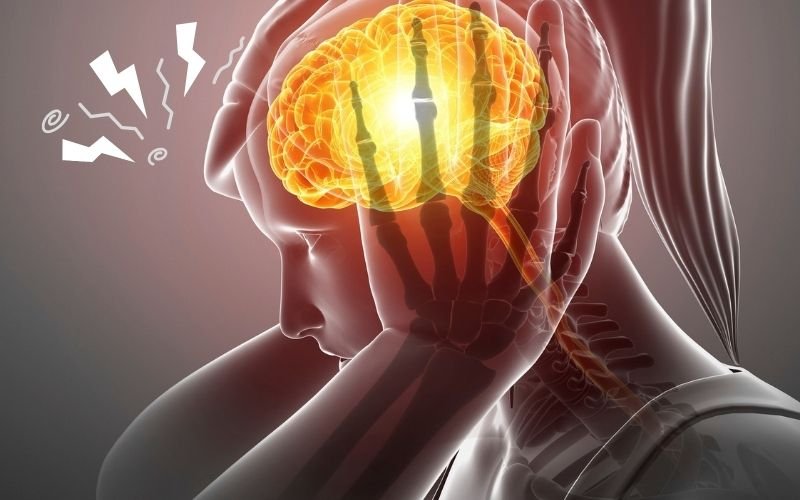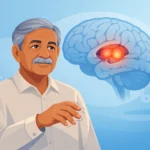Migraine is not a common headache. It is a neurological condition. It causes strong, pulsing pain. This pain usually begins on one side of the head. The pain may last for hours or days. It can affect work, daily life, and mental health. The World Health Organization (WHO) has called migraine one of the top disabling conditions globally.
Migraine symptoms often include nausea, light sensitivity, and sound sensitivity. Some patients also see visual changes or feel strange sensations before the headache begins. This phase is known as an aura.
Delhi, with its rising stress levels, air pollution, and long work hours, is seeing more migraine cases. The demand for migraine treatment in Delhi is growing fast. Top neurology hospitals and the best brain doctors in Delhi are treating patients with new approaches that offer long-term relief.
Different Types of Migraine Patients Must Know
Not all migraines are the same. Knowing your migraine type helps doctors offer proper treatment. Here are the most common ones:
Migraine with Aura
This includes warning signs like flashing lights, blind spots, or speech trouble before the headache. Auras usually last for 20–60 minutes.
Migraine without Aura
This is the most common type. It has no warning signs. It starts with a dull ache that grows strong.
Chronic Migraine
This means you have migraine attacks on 15 or more days per month. It affects life quality a lot.
Menstrual Migraine
This happens around a woman’s period. Hormone shifts trigger the pain.
Hemiplegic Migraine
This rare form causes temporary weakness on one side of the body. It may look like a stroke.
Silent Migraine
This is also called acephalgic migraine. It shows aura symptoms but no head pain.
What Triggers a Migraine Attack?
Migraine is triggered by both internal and external factors. Below are common triggers:
Stress and Anxiety
Mental pressure can set off an attack. Relaxation techniques can help.
Food and Beverages
Chocolate, cheese, processed meats, and alcohol may act as triggers. Skipping meals also leads to migraines.
Weather Changes
Heat, humidity, and sudden weather changes affect brain chemicals. These may start a migraine.
Sleep Disruptions
Too much or too little sleep affects brain balance and leads to pain.
Hormonal Changes
Changes in estrogen during menstruation or menopause can trigger attacks.
Strong Lights or Sounds
Bright screens, flickering bulbs, or loud music often make migraines worse.
Smells and Scents
Perfumes, paint, or strong kitchen smells may act as migraine triggers.
Diagnosing Migraine in Delhi
If you have frequent headaches, you must visit a migraine doctor in Delhi. Doctors at top neurology hospitals in Delhi will first study your symptoms. They may ask you to keep a headache diary.
Tests may include:
- MRI or CT Scan: To rule out tumors or brain bleeding
- EEG (Electroencephalogram): To track brain activity
- Blood Tests: To check hormone levels or vitamin shortages
A good diagnosis helps build the right plan. The best neurology hospital in Delhi will personalize your care with expert attention.
Medicines Used in Migraine Treatment
Medicine works in two ways: one for stopping pain once it starts and one for preventing the next attack.
Acute Migraine Medicines:
Used at the first sign of pain
- Triptans (like Sumatriptan): Narrow blood vessels and block pain pathways
- NSAIDs (like ibuprofen): Help reduce inflammation
- Anti-nausea drugs (like metoclopramide): Control vomiting
- Ergots: Used when triptans don’t work
Preventive Migraine Medicines:
Given if you get attacks more than 4 times a month
- Beta-blockers (like propranolol): Calm blood vessels
- Anti-seizure drugs (like topiramate): Control brain activity
- Antidepressants (like amitriptyline): Help with stress and sleep
- CGRP inhibitors: A new class of drugs made to stop migraines
Migraine medicine must be taken with a doctor’s advice. Overuse may cause rebound headaches.
Non-Medical Migraine Remedies at Home
Along with medicine, home remedies work well. You can use:
Cold Compress
Place a cool cloth on the forehead. It slows nerve signals and lowers pain.
Hydration
Drink enough water. Dehydration may cause or worsen migraines.
Caffeine in Small Doses
Caffeine helps block brain pain signals. But too much can cause withdrawal headaches.
Rest in a Dark Room
Light and noise worsen migraines. Lie down in a dark, silent room.
Massage and Neck Stretching
Tight neck muscles add to the pain. A gentle massage helps. So do shoulder rolls and neck stretches.
Food and Diet Tracking
Avoid known triggers like MSG, artificial sweeteners, and aged cheese. A migraine food diary helps identify what’s safe for you.
Alternative Therapies for Long-Term Relief from Migraine
Many patients in Delhi try non-drug treatments. These work well alongside medicine.
Acupuncture
Fine needles placed in key body points help balance energy. Studies show acupuncture lowers the number of attacks.
Yoga and Deep Breathing
These reduce tension. Poses like child’s pose and corpse pose are helpful.
Biofeedback
A machine teaches you to control body functions. This includes heart rate, muscle tension, and skin temperature.
Ayurveda and Herbal Oils
Some oils like peppermint, lavender, and eucalyptus ease headache pain when rubbed on the temples.
Sleep for Migraine and Stress Management
Improving sleep hygiene and lowering stress are vital. You can try:
- Fixed sleep hours
- No screen time before bed
- Meditation or mindfulness in the morning
- Simple walking or hobbies after work
These reduce the chances of new migraine attacks.
When to Seek a Neurologist for Migraine Urgently in emergency
Sometimes migraine signs point to a bigger issue. See a doctor right away if you notice:
- Sudden, severe headache
- Trouble speaking
- Weakness or numbness
- Headache after injury
- Vision loss
These signs may be stroke symptoms or something more serious.
Living with Chronic Migraine: What You Need to Know
When migraine becomes chronic, it affects your whole life. Chronic migraine means you experience pain for more than 15 days a month. These attacks may last long and affect your ability to work or socialize. In Delhi, more patients now face this problem due to stress and environmental triggers.
To manage chronic migraine, doctors use a combination of migraine medicine, lifestyle changes, and preventive therapies. You might also need a referral to a neurology hospital in Delhi where specialists can create a treatment plan just for you.
Migraines in Children and Teenagers
Children also suffer from migraines. Their symptoms may differ from adults. A child may feel irritable, avoid light, or complain of tummy pain. School pressure, screen time, and poor sleep increase the risk.
If your child has repeated headaches, take them to a migraine doctor in Delhi or a child neurologist. Early treatment helps prevent learning problems and emotional stress.
Hormones and Migraine: A Woman’s Guide
Many women notice that migraine attacks worsen during their periods, pregnancy, or menopause. This happens due to hormone shifts, especially estrogen. In Delhi, gynaecologists and neurologists often work together to treat these cases.
If you suffer from menstrual migraines, the doctor may suggest:
- Hormone therapy
- Magnesium supplements
- Birth control changes
- Special migraine treatments for women
This combination reduces the pain and helps control monthly symptoms.
Migraine Aura and Its Risks
An aura is a set of symptoms that appear before the actual headache starts. These can include:
- Blurred vision
- Bright flashing lights
- Numbness in arms or face
- Difficulty speaking
Auras can be scary. But they are not usually dangerous. However, people with migraine aura have a slightly higher risk of stroke, especially if they smoke or take birth control. It is important to tell your doctor about aura symptoms. That way, your treatment plan can be safer.
How to Track Migraine Symptoms Effectively
Keeping a migraine diary helps you notice patterns. You should write down:
- Time of day the headache started
- Foods eaten before the attack
- Weather or sleep changes
- Medicine taken and results
Apps and journals help you and your migraine doctor in Delhi adjust treatments better. This is very helpful for people with hard-to-treat migraines.
Preventive Steps to Lower Attack Frequency
Prevention is better than cure. Here are steps you can take:
- Drink 8–10 glasses of water daily
- Avoid skipping meals
- Take short screen breaks
- Keep your room quiet and cool while resting
- Do daily breathing or meditation exercises
- Get 7–9 hours of sleep each night
These changes may lower the number of monthly attacks.
Migraine and Its Link with Mental Health
Many migraine sufferers feel anxious or depressed. That’s because pain affects your daily routine. You may miss work, cancel plans, or lose sleep. Over time, this affects mental well-being.
Talk to your doctor about emotional symptoms. Counseling and cognitive behavior therapy (CBT) can help. You may also join support groups for chronic pain patients in Delhi.
Migraine is painful, but with expert care, it is manageable. At Primus Hospital, a leading neurology hospital in Delhi, you get access to world-class migraine diagnosis and therapy. From lifestyle advice to the latest medical solutions like Botox and CGRP blockers, Primus offers complete care under one roof.
If you or someone you know is battling chronic headaches or unexplained migraines, book a consultation with the best brain doctor in Delhi at Primus Hospital today. Early action saves time, prevents complications, and improves life.
FAQs on Migraine Treatment and Causes
Triggers like stress, poor sleep, food, or hormone shifts usually cause migraine attacks.
There is no complete cure, but the right mix of treatment and lifestyle changes can control it well.
Most migraines are not life-threatening. But some types with aura may slightly increase stroke risk.
A neurologist or a migraine doctor in Delhi treats migraine. Hospitals with a neurology department are best.
Not usually. But severe, sudden, or changing headaches should be checked with an MRI to rule out problems.













